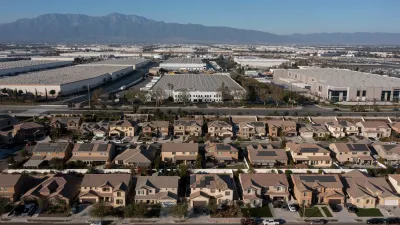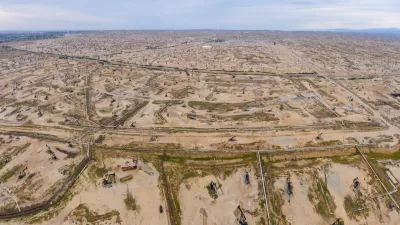A new study estimates there are at least 500 million off-street parking spaces in the U.S. This represents 0.5% to 12% of estimated lifecycle energy consumption and greenhouse emissions, and 24% to 81% other air pollutants.
A major study estimates there to be between 105 million and 2 billion parking spaces in the U.S. These results are incorporated into their life-cycle environmental analysis of various vehicles (sedans, sports utility vehicles, and pickups). The analysis indicates that parking facilities represent 0.5% to 12% of total estimated lifecycle energy consumption and greenhouse emissions, and 24% to 81% other air pollutants, depending on vehicle type and scenario. The environmental consequences of providing the parking spaces are discussed as well as the uncertainty in allocating paved area between parking and roadways.
The original study is Mikhail Chester, Arpad Horvath and Samer Madanat (2010), "Parking Infrastructure: Energy, Emissions, And Automobile Life-Cycle Environmental Accounting," published in Environmental Research Letters, *(http://dx.doi.org/10.1088/1748-9326/5/3/034001 ), an addition to "Environmental Life-cycle Assessment of Passenger Transportation: A Detailed Methodology for Energy, Greenhouse Gas and Criteria Pollutant Inventories of Automobiles, Buses, Light Rail, Heavy Rail and Air", UC Berkeley Center for Future Urban Transport: A Volvo Center of Excellence (www.sustainable-transportation.com)
Thanks to Todd Litman

Alabama: Trump Terminates Settlements for Black Communities Harmed By Raw Sewage
Trump deemed the landmark civil rights agreement “illegal DEI and environmental justice policy.”

Planetizen Federal Action Tracker
A weekly monitor of how Trump’s orders and actions are impacting planners and planning in America.

The 120 Year Old Tiny Home Villages That Sheltered San Francisco’s Earthquake Refugees
More than a century ago, San Francisco mobilized to house thousands of residents displaced by the 1906 earthquake. Could their strategy offer a model for the present?

Ken Jennings Launches Transit Web Series
The Jeopardy champ wants you to ride public transit.

BLM To Rescind Public Lands Rule
The change will downgrade conservation, once again putting federal land at risk for mining and other extractive uses.

Indy Neighborhood Group Builds Temporary Multi-Use Path
Community members, aided in part by funding from the city, repurposed a vehicle lane to create a protected bike and pedestrian path for the summer season.
Urban Design for Planners 1: Software Tools
This six-course series explores essential urban design concepts using open source software and equips planners with the tools they need to participate fully in the urban design process.
Planning for Universal Design
Learn the tools for implementing Universal Design in planning regulations.
Clanton & Associates, Inc.
Jessamine County Fiscal Court
Institute for Housing and Urban Development Studies (IHS)
City of Grandview
Harvard GSD Executive Education
Toledo-Lucas County Plan Commissions
Salt Lake City
NYU Wagner Graduate School of Public Service





























